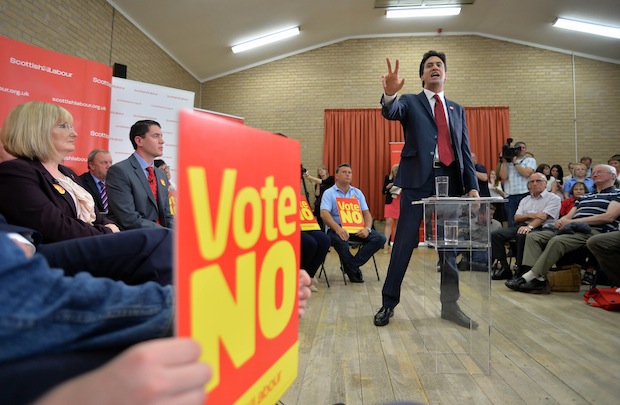While Westminster sent its own plea to Scottish voters, David Cameron and Ed Miliband were both making fine, impassioned speeches that both tried to scotch the SNP line that a ‘Yes’ vote was the only way to achieve a fairer Scotland. David Cameron had to address to specific – and quite beguiling – argument that this is Scotland’s chance to get rid of the Tories, that from independence onwards, it will never be governed by parties poorly represented within its borders. He did so by being a little attention-seeking:
‘I think the third thing that can come across in the remaining part of this campaign is the scale of the decision that Scottish people will be taking in eight days’ time. I think sometimes, because it’s an election, because it’s a ballot, I think people can feel it’s a bit like a general election that you make a decision and then five years later you can make another decision. If you’re fed up with the effing Tories, give them a kick and maybe we’ll think again.
‘This is totally different. This is a decision about, not the next five years, but the next century. Of course it’s absolutely the Scottish people, and the Scottish people alone who should make that choice, but I think it’s important that everyone knows the scale of the choice being made in Scotland.’
Some might argue that the line about ‘if you’re fed up with the effing Tories, give them a kick’ is so easily edited by the SNP that it helps their cause. But it is also so striking because of the word ‘effing’ that it will be reported more widely.
The Prime Minister appeared emotional as he closed his speech. Ed Miliband delivered a similarly-charged message to Scots. It was one of the finest speeches I’ve seen him give: passionate, fluent, sincere. He too tried to address the ‘vote yes to kick the Tories out’ line by saying that a Labour government would get ‘rid of David Cameron’s government’, and trying to argue that an independent Scotland ruled by a Salmond government would not be more socially just than a Labour-run United Kingdom.
He divided his speech between arguments of the head, heart and the soul to stay in the Union. His section on the soul was the most powerful. Miliband told the audience that ‘solidarity is not just a historical artefact: it is there to be built upon today’. He called on voters to ‘change Britain together’, suggesting that they had a better chance of getting rid of the social injustice the SNP points to by not leaving the Union.
They were two fine speeches. Cameron’s had the most attention-seeking line, but Miliband’s the deeper emotional appeal to the Scottish voters who need to be won over before next Thursday. The leaders are in a panic, but in this instance, they’ve panicked well.







Comments